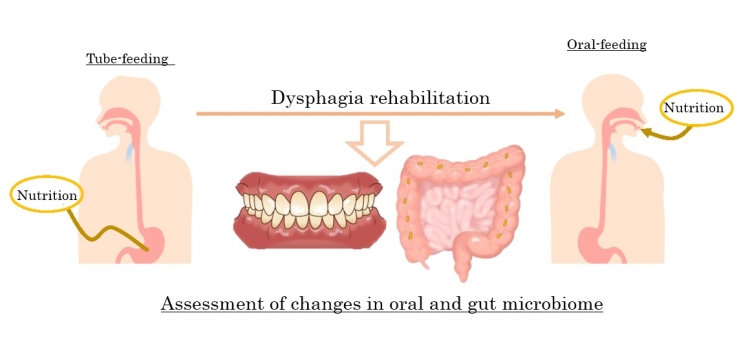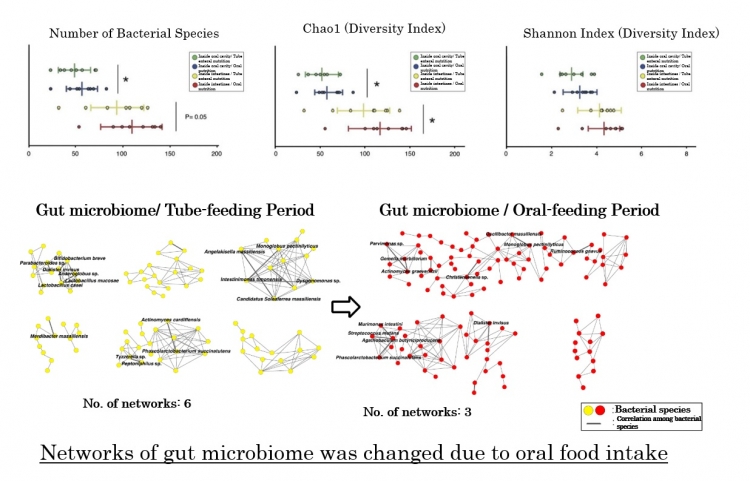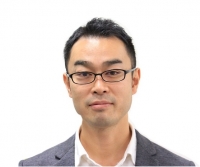"Elucidating the relationship of oral nutrition to systemic health" -Oral and gut microbiome are key: prospects for improvement of medical care through dysphagia rehabilitation-
Key Points
| ● The research group found that re-initiation of oral nutrition*1 modifies oral and gut microbiota even under the same nutritional conditions. |
| ● They demonstrated the importance of dysphagia rehabilitation*2 from a view of microbiology. |
| ● Dysphagia rehabilitation based on an understanding of the importance of eating is expected to help improve medical care in the future. |
A research group led by Assistant Professor Sayaka Katagiri, of the Periodontology and Associate Professor Haruka Tohara of the Gerodontology and Oral Rehabilitation, Graduate School of Medical and Dental Sciences, Tokyo Medical and Dental University have demonstrated the importance of oral food intake from a a view of microbiology. This study was supported by the Ministry of Education, Culture, Sports, Science and Technology's Grants-in-Aid for Scientific Research and the 8020 Promotion Foundation's 8020 Research Project and was published online in the international scientific journal, Frontiers in Cellular and Infection Microbiology on December 20, 2019 at midnight (Eastern Time).
Background of Research
After a stroke, many patients are incapable of oral nutrition and require tube-feeding.*3 Swallowing training is one of the rehabilitation techniques available to help patients reacquire oral nutrition, and numerous previous studies have reported its efficacy for this purpose. The oral cavity and the large intestine are connected by the intestinal tract to which the action of swallowing sends food, saliva, and oral microbes; hence, these factors have the potential to affect changes in the intestinal flora. However, it was unclear just how oral nutrition might influence intestinal flora. The research team in the present study therefore examined the relationship between the reacquisition of oral nutrition and oral and intestinal floras from a bacteriological perspective.

Outline of Research Results
The present study enrolled eight patients who were on tube-feeding during the subacute stage of stroke, then re-initiated oral nutrition after received swallowing training. Saliva and stool samples were collected during the period of tube-feeding before the start of dysphagia rehabilitation and after the re-initiation of oral nutrition following the rehabilitation. The caloric intake of the patients was kept constant during this period. Thereafter, a next generation sequencer*4 was used to identify the oral and intestinal flora species, to analyze the correlation among the bacterial species, and to reveal the predicted functions (functional genes) of the organisms. The results showed that the re-initiation of oral feeding had increased the diversity of oral and gut microbione.
Moreover, the family of Carnobacteriaceae and genus Granulicatella were increased both in the mouth and gut following the re-initiation of oral food intake. In addition, the network structure showing the correlation among the various bacterial species also changed both in the mouth and gut after re-initiation of oral food intake into such that more bacteria were present in a single network. A comparison of the tube feeding and oral nutrition periods based on the results of the function prediction analysis revealed that the oral nutrition could induce more expression of metabolic pathways.
Moreover, the family of Carnobacteriaceae and genus Granulicatella were increased both in the mouth and gut following the re-initiation of oral food intake. In addition, the network structure showing the correlation among the various bacterial species also changed both in the mouth and gut after re-initiation of oral food intake into such that more bacteria were present in a single network. A comparison of the tube feeding and oral nutrition periods based on the results of the function prediction analysis revealed that the oral nutrition could induce more expression of metabolic pathways.

Significance of the Research Results
The research team found that dysphagia rehabilitation in patients with dysphagia not only restored their oral food intake capability but also increased the diversity of oral and gut microbiome, modified the composition of the microbiota, and influenced their co-occurrence network structure. While it was already known that intestinal flora has various effects on many kinds of diseases, the present study demonstrated from a view of microbiology that the re-initiation of oral food intake is also crucial for maintaining health, and may thus be important for designing future treatment strategies.
Glossary
*1 Oral nutrition
Taking in food via the mouth
*2 Dysphagia rehabilitation
Functional training aimed at increasing the motility of the swallowing organs
*3 Tube-feeding
A method of feeding using a tube or catheter to inject the nutrients directly into the stomach or intestines
*4 Next generation sequencer
A device which reads gene sequences at high speeds
Taking in food via the mouth
*2 Dysphagia rehabilitation
Functional training aimed at increasing the motility of the swallowing organs
*3 Tube-feeding
A method of feeding using a tube or catheter to inject the nutrients directly into the stomach or intestines
*4 Next generation sequencer
A device which reads gene sequences at high speeds
Article Information
Journal : Frontiers in Cellular and Infection Microbiology
Article title: Re-initiation of oral food intake following enteral nutrition alters oral and gut microbiota communities
DOI: 10.3389/fcimb.2019.00434
Article title: Re-initiation of oral food intake following enteral nutrition alters oral and gut microbiota communities
DOI: 10.3389/fcimb.2019.00434
Researcher profile

Sayaka Katagiri, Assistant Professor of Periodontology
Tokyo Medical and Dental University
Research area: relationship between the oral cavity and the whole body, relationship between periodontitis and diabetes
Tokyo Medical and Dental University
Research area: relationship between the oral cavity and the whole body, relationship between periodontitis and diabetes

Haruka Tohara, Associate professor of Gerodontology and Oral Rehabilitation
Tokyo Medical and Dental University
Research area: Swallowing training as rehabilitation, relationship between perioral muscles and the whole body
Tokyo Medical and Dental University
Research area: Swallowing training as rehabilitation, relationship between perioral muscles and the whole body
Contact Information
【Regarding research】
Sayaka Katagiri, Assistant Professor of Periodontology
Graduate School of Medical and Dental Sciences
Tokyo Medical and Dental University
TEL: +81-3-5803-5488
FAX: +81-3-5803-0193
E-mail: kataperi@tmd.ac.jp
Haruka Tohara, Associate professor of Gerodontology and Oral Rehabilitation
Graduate School of Medical and Dental Sciences
Tokyo Medical and Dental University
TEL: +81-3-5803-5559
FAX: +81-3-5803-5559
E-mail: haruka-t@rd5.so-net.ne.jp
【Regarding press】
Public Relations Division
Tokyo Medical and Dental University
1-5-45 Yushima
Bunkyou-ku, Tokyo 113-8510
TEL: +81-3-5803-5833
FAX: +81-3-5803-0272
E-mail: kouhou.adm@tmd.ac.jp
Sayaka Katagiri, Assistant Professor of Periodontology
Graduate School of Medical and Dental Sciences
Tokyo Medical and Dental University
TEL: +81-3-5803-5488
FAX: +81-3-5803-0193
E-mail: kataperi@tmd.ac.jp
Haruka Tohara, Associate professor of Gerodontology and Oral Rehabilitation
Graduate School of Medical and Dental Sciences
Tokyo Medical and Dental University
TEL: +81-3-5803-5559
FAX: +81-3-5803-5559
E-mail: haruka-t@rd5.so-net.ne.jp
【Regarding press】
Public Relations Division
Tokyo Medical and Dental University
1-5-45 Yushima
Bunkyou-ku, Tokyo 113-8510
TEL: +81-3-5803-5833
FAX: +81-3-5803-0272
E-mail: kouhou.adm@tmd.ac.jp

